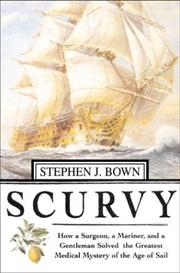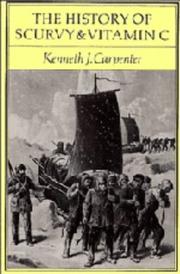| Listing 1 - 8 of 8 |
Sort by
|
Book
Year: 1801 Publisher: A Bruxelles : de l'imprimerie de Weissenbruch,
Abstract | Keywords | Export | Availability | Bookmark
 Loading...
Loading...Choose an application
- Reference Manager
- EndNote
- RefWorks (Direct export to RefWorks)

ISBN: 0312313918 9780312313913 Year: 2004 Publisher: New York : Thomas Dunne Books, St. Matin's Press,
Abstract | Keywords | Export | Availability | Bookmark
 Loading...
Loading...Choose an application
- Reference Manager
- EndNote
- RefWorks (Direct export to RefWorks)
Scurvy took a terrible toll in the Age of Sail, killing more sailors than were lost in all sea battles combined. The threat of the disease kept ships close to home and doomed those vessels that ventured too far from port. The willful ignorance of the royal medical elite, who endorsed ludicrous medical theories based on speculative research while ignoring the life-saving properties of citrus fruit, cost tens of thousands of lives and altered the course of many battles at sea. The cure for scurvy ranks among the greatest of human accomplishments, yet its impact on history has, until now, been largely ignored. From the earliest recorded appearance of the disease in the sixteenth century, to the eighteenth century, where a man had only half a chance of surviving the scourge, to the early nineteenth century, when the British conquered scurvy and successfully blockaded the French and defeated Napoleon,Scurvyis a medical detective story for the ages, the fascinating true story of how James Lind (the surgeon), James Cook (the mariner), and Gilbert Blane (the gentleman) worked separately to eliminate the dreaded affliction. Scurvyis an evocative journey back to the era of wooden ships and sails, when the disease infiltrated every aspect of seafaring life: press gangs "recruit" mariners on the way home from a late night at the pub; a terrible voyage in search of riches ends with a hobbled fleet and half the crew heaved overboard; Cook majestically travels the South Seas but suffers an unimaginable fate. Brimming with tales of ships, sailors, and baffling bureaucracy,Scurvyis a rare mix of compelling history and classic adventure story. Stephen R. Bownwas born in Ottawa and graduated in history from the University of Alberta. He has a special interest in the history of science and exploration. His books includeThe Naturalists: Scientific Travelers in the Golden Age of Natural History.He lives in the Canadian Rockies with his wife and two young children. Scurvy took a terrible toll in the Age of Sail, killing more sailors than were lost in all sea battles combined. The threat of the disease kept ships close to home and doomed those vessels that ventured too far from port. The willful ignorance of the royal medical elite, who endorsed ludicrous medical theories based on speculative research while ignoring the life-saving properties of citrus fruit, cost tens of thousands of lives and altered the course of many battles at sea. The cure for scurvy ranks among the greatest of human accomplishments, yet its impact on history has, until now, been largely ignored. From the earliest recorded appearance of the disease in the sixteenth century, to the eighteenth century, where a man had only half a chance of surviving the scourge, to the early nineteenth century, when the British conquered scurvy and successfully blockaded the French and defeated Napoleon,Scurvyis a medical detective story for the ages, the fascinating true story of how James Lind (the surgeon), James Cook (the mariner), and Gilbert Blane (the gentleman) worked separately to eliminate the dreaded affliction. Scurvyis an evocative journey back to the era of wooden ships and sails, when the disease infiltrated every aspect of seafaring life: press gangs "recruit" mariners on the way home from a late night at the pub; a terrible voyage in search of riches ends with a hobbled fleet and half the crew heaved overboard; Cook majestically travels the South Seas but suffers an unimaginable fate. Brimming with tales of ships, sailors, and baffling bureaucracy, Scurvy is a rare mix of compelling history and classic adventure story. "In writing that is fast on its feet, Bown introduces both drama and incredulity into the mix . . . in this splendid, popular telling of the scurvy story."American Geographical Society "A swift and powerf

ISBN: 0521320291 Year: 1986 Publisher: Cambridge ; New York : Cambridge University Press,
Abstract | Keywords | Export | Availability | Bookmark
Book
Abstract | Keywords | Export | Availability | Bookmark
 Loading...
Loading...Choose an application
- Reference Manager
- EndNote
- RefWorks (Direct export to RefWorks)
Food --- Grain --- Open air life --- Physical training --- physiology --- Scurvy --- Vitamins
Book
Abstract | Keywords | Export | Availability | Bookmark
 Loading...
Loading...Choose an application
- Reference Manager
- EndNote
- RefWorks (Direct export to RefWorks)
Diet --- Food --- Physical education and training --- physiology --- Scurvy --- Vitamins

ISBN: 0521347734 9780521347730 0521320291 Year: 1988 Publisher: Cambridge : Cambridge University Press,
Abstract | Keywords | Export | Availability | Bookmark
 Loading...
Loading...Choose an application
- Reference Manager
- EndNote
- RefWorks (Direct export to RefWorks)
Ascorbic Acid --- Scurvy --- 577.164.2 --- history. --- Vitamin C (ascorbic acid) --- 577.164.2 Vitamin C (ascorbic acid) --- History --- Vitamin C --- Scurvy - History. --- Vitamin C - History. --- Ascorbic Acid - history. --- Scurvy - history. --- history --- History.
Book
ISBN: 0750939931 9780750939935 Year: 2005 Publisher: Stroud : Sutton,
Abstract | Keywords | Export | Availability | Bookmark
 Loading...
Loading...Choose an application
- Reference Manager
- EndNote
- RefWorks (Direct export to RefWorks)
In 1740, Commodore George Anson left Portsmouth with seven ships and nearly 2,000 men. He returned four years later with under 600. Only four were killed by the enemy; the rest died not as the result of war, weather or misnavigation, but of scurvy. Limeys is the dramatic history of Dr. James Lind's heroic efforts to find a cure for this 'dreaded disease' in the face of the corrosive patronage and establishment antipathy of the times. In the three centuries prior to 1800, it has been estimated that scurvy killed at least two million sailors. It was characterized by rotting gums, fetid breath, swelling limbs, malaise and hemorrhaging. Desperate men took any "cure" offered - urine mouthwashes, sulphuric acid, bloodletting, even burial up to the neck in sand. Most died. In 1747 Lind, a Scottish Naval Surgeon, conducted the first practical medical research to find a cure. He recommended lemons, oranges and their juice. Yet he was unable to penetrate the Admiralty high-mindedness, or to persuade them to enforce the fruits' universal application. Only in 1795, when court physician Gilbert Blane championed Lind's work, were the Sea Lords persuaded to act. But by then, James Lind had been dead for a year and thousands had needlessly perished. From sailors, citrus fruits and "Limeys" to the birth of Rose's Lime Juice Cordial, the world's first soft drink, this book tells the extraordinary, graphic and compelling story of the epic quest to conquer one of mankind's most terrible diseases.
Ship physicians --- Scurvy --- Medicine, Naval --- Seafaring life --- History --- Prevention --- Lind, James,
Book
Abstract | Keywords | Export | Availability | Bookmark
 Loading...
Loading...Choose an application
- Reference Manager
- EndNote
- RefWorks (Direct export to RefWorks)
Dairy products --- Diseases --- General Science --- Guinea pigs --- Guinea pigs as laboratory animals --- Health aspects --- Milk --- Scurvy --- Theses --- UIUC
| Listing 1 - 8 of 8 |
Sort by
|

 Search
Search Feedback
Feedback About UniCat
About UniCat  Help
Help News
News